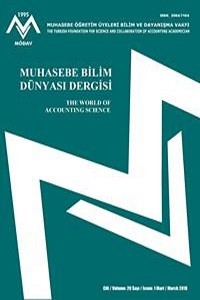Abstract
Kamu sektörünün dürüstlük odaklı geliştirilmesi, Yüksek
Denetim Kurumlarının denetim çalışmalarını “etik” ve “etik yönetimin”
önceliklendirildiği “etik denetimler” şeklinde bir yaklaşımla yürütmelerini
zorunlu hale getirmektedir. Kamu sektöründe etik denetimlere duyulan ihtiyaç
yüksek denetim kurumlarının üyesi oldukları organizasyonlarda da gündem
konusunu oluşturmaktadır. Örneğin, Avrupa Sayıştaylar Birliği (EUROSAI)
bünyesinde yer alan Denetim ve Etik Çalışma Gücü tarafından 2017 yılında “Kamu
Sektörü Organizasyonlarında Etik Denetim” konulu bir rehber hazırlanmıştır. Yüksek
denetim kurumları, yapacakları etik denetimler aracılığıyla kamu yönetimine
olan güvenin korunması ve geliştirilmesinde, ilgili ülkenin kamu sektöründe
etik yönetim sisteminin güçlendirilmesinde önemli bir rol oynayacaklardır.
Çalışmanın amacı, sürdürülebilir gelişmeyi de dikkate
alarak Yüksek Denetim Kurumlarınca yapılması gereken etik denetimler, nasıl
yapılabileceği ve sağlayacağı kazanımlar hakkında farkındalığı geliştirmektir.
References
- Referans1 Eryılmaz, B. (2008). “Etik Kültürü Geliştirmek”, http://etik.gov.tr/Portals/0/makaleler/1-12bilaleryilmaz.pdf, (18.09.2017)
- Referans2 EUROSAI Task Force Audit&Ethics (TFAE) Paper (2014), Auditing Ethics in the Public Sector, A general overview of SAI’s practices, http://www.eurosai-tfae.tcontas.pt/activities/Papers/Activities/Auditing%20Ethics/TFAE_paper%20Auditing%20Ethics%20in%20Public%20Sector%20(EN).pdf, (01.06.2017)
- Referans3 EUROSAI Task Force Audit&Ethics (TFAE) Guideline (2017), “Audit of Ethics in Public Sector Organisations, http://www.eurosai-tfae.tcontas.pt/activities/Papers/ Activities/Guidance/Guidelines%20to%20audit%20ethics.pdf, (01.06.2017)
- Referans4 INTOSAI ISSAI 100, http://www.issai.org/en_us/site-issai/issai-framework/3-fundamental-auditing-priciples.htm, (01.06.2017)
- Referans5 INTOSAI ISSAI 12, http://www.issai.org/en_us/site-issai/issai-framework/2-prerequisites-for-the-functioning-of-sais.htm , (01.06.2017)
- Referans6 INTOSAI ISSAI 200, http://www.issai.org/en_us/site-issai/issai-framework/3-fundamental-auditing-priciples.htm, (01.06.2017)
- Referans7 INTOSAI ISSAI 300, http://www.issai.org/en_us/site-issai/issai-framework/3-fundamental-auditing-priciples.htm, (01.06.2017)
- Referans8 INTOSAI ISSAI 400, http://www.issai.org/en_us/site-issai/issai-framework/3-fundamental-auditing-priciples.htm, (01.06.2017)
- Referans9 INTOSAI ISSAI 5130, http://www.issai.org/en_us/site-issai/issai-framework/4-auditing-guidelines.htm, (01.06.2017)
- Referans10 Köse, Dr. H. Ö. 2007. “Dünyada ve Türkiye’de Yüksek Denetim”, https://www.sayistay.gov.tr/tr/Upload/95906369/files/yayinlar/Dunyada_Turkiyede_Yusek_Denetim.pdf, (02.10.2017)
- Referans11 OECD (2005), “Public Sector Integrity, A Framework For Assessment”, http://www.keepeek.com/Digital-Asset-Management/oecd/governance/public-sector-integrity_9789264010604-en#.WZVPclFJaUk, (17.08.2017)
- Referans12 The Council of Ethics for the Public Service of the Republic of Turkey, 2009, “An Ethics Reminder For Public Officials”, http://etik.gov.tr/Portals/0/en/Ethics%20Reminder%20for%20Public%20Officials.pdf, (Access: 25.09.2019)
- Referans13 UZUN, Y. 2017. “Yüksek Denetim Kurumları ve Etik Denetim”, Sayıştay Dergisi, Sayı: 105, https://www.sayistay.gov.tr/tr/Upload/95906369/files/dergi/pdf/dergi_105_m3.pdf, (20.09.2017)
- Referans14 Yağanak, E., Önkal, G., “Çevre Etiği”, Felsefe ansiklopedisi (ed.A.Cevizci), Ankara, Nobel Yayınları, 3. Cilt, 2005,s.590, Aktaran: Cevizci, A. 2013. Uygulamalı Etik, 1. Baskı, Say Yayınları, , s.121
Abstract
References
- Referans1 Eryılmaz, B. (2008). “Etik Kültürü Geliştirmek”, http://etik.gov.tr/Portals/0/makaleler/1-12bilaleryilmaz.pdf, (18.09.2017)
- Referans2 EUROSAI Task Force Audit&Ethics (TFAE) Paper (2014), Auditing Ethics in the Public Sector, A general overview of SAI’s practices, http://www.eurosai-tfae.tcontas.pt/activities/Papers/Activities/Auditing%20Ethics/TFAE_paper%20Auditing%20Ethics%20in%20Public%20Sector%20(EN).pdf, (01.06.2017)
- Referans3 EUROSAI Task Force Audit&Ethics (TFAE) Guideline (2017), “Audit of Ethics in Public Sector Organisations, http://www.eurosai-tfae.tcontas.pt/activities/Papers/ Activities/Guidance/Guidelines%20to%20audit%20ethics.pdf, (01.06.2017)
- Referans4 INTOSAI ISSAI 100, http://www.issai.org/en_us/site-issai/issai-framework/3-fundamental-auditing-priciples.htm, (01.06.2017)
- Referans5 INTOSAI ISSAI 12, http://www.issai.org/en_us/site-issai/issai-framework/2-prerequisites-for-the-functioning-of-sais.htm , (01.06.2017)
- Referans6 INTOSAI ISSAI 200, http://www.issai.org/en_us/site-issai/issai-framework/3-fundamental-auditing-priciples.htm, (01.06.2017)
- Referans7 INTOSAI ISSAI 300, http://www.issai.org/en_us/site-issai/issai-framework/3-fundamental-auditing-priciples.htm, (01.06.2017)
- Referans8 INTOSAI ISSAI 400, http://www.issai.org/en_us/site-issai/issai-framework/3-fundamental-auditing-priciples.htm, (01.06.2017)
- Referans9 INTOSAI ISSAI 5130, http://www.issai.org/en_us/site-issai/issai-framework/4-auditing-guidelines.htm, (01.06.2017)
- Referans10 Köse, Dr. H. Ö. 2007. “Dünyada ve Türkiye’de Yüksek Denetim”, https://www.sayistay.gov.tr/tr/Upload/95906369/files/yayinlar/Dunyada_Turkiyede_Yusek_Denetim.pdf, (02.10.2017)
- Referans11 OECD (2005), “Public Sector Integrity, A Framework For Assessment”, http://www.keepeek.com/Digital-Asset-Management/oecd/governance/public-sector-integrity_9789264010604-en#.WZVPclFJaUk, (17.08.2017)
- Referans12 The Council of Ethics for the Public Service of the Republic of Turkey, 2009, “An Ethics Reminder For Public Officials”, http://etik.gov.tr/Portals/0/en/Ethics%20Reminder%20for%20Public%20Officials.pdf, (Access: 25.09.2019)
- Referans13 UZUN, Y. 2017. “Yüksek Denetim Kurumları ve Etik Denetim”, Sayıştay Dergisi, Sayı: 105, https://www.sayistay.gov.tr/tr/Upload/95906369/files/dergi/pdf/dergi_105_m3.pdf, (20.09.2017)
- Referans14 Yağanak, E., Önkal, G., “Çevre Etiği”, Felsefe ansiklopedisi (ed.A.Cevizci), Ankara, Nobel Yayınları, 3. Cilt, 2005,s.590, Aktaran: Cevizci, A. 2013. Uygulamalı Etik, 1. Baskı, Say Yayınları, , s.121
Details
| Primary Language | Turkish |
|---|---|
| Subjects | Business Administration |
| Journal Section | MAIN SECTION |
| Authors | |
| Publication Date | June 8, 2018 |
| Submission Date | October 23, 2017 |
| Published in Issue | Year 2018 Volume: 20 Issue: 1 |
Cited By
Etik Kültürünün Geliştirilmesinde Sivil Toplumun Rolü
Akademik İncelemeler Dergisi (AID)
Fatih ALTUN
https://doi.org/10.17550/akademikincelemeler.860683
Authorship
MBDD follows the guidelines in COPE Authorship Guideline to ensure fair recognition of contributions to a research paper (https://publicationethics.org/guidance/discussion-document/authorship ). Authorship carries both credit and responsibility, and it is essential that all listed authors have made significant contributions to the research.
For multi-author studies, the Contributions of Authors must be declared after the conclusion and before the bibliography of the paper. The authors' initials and last names should be used to indicate which author contributed to which part of the manuscript. Details can be found by clicking the “Article Submission Checklist” button. The authors can acknowledge contributions that do not merit authorship.
The author(s) should disclose the use of generative Artificial Intelligence (AI) and AI-assisted tools in design and implementation of the research. Such use need to be disclosed within the methodology section of the manuscript. Use of AI does not preclude the manuscript from publication, rather provides a transparent picture of the research.


